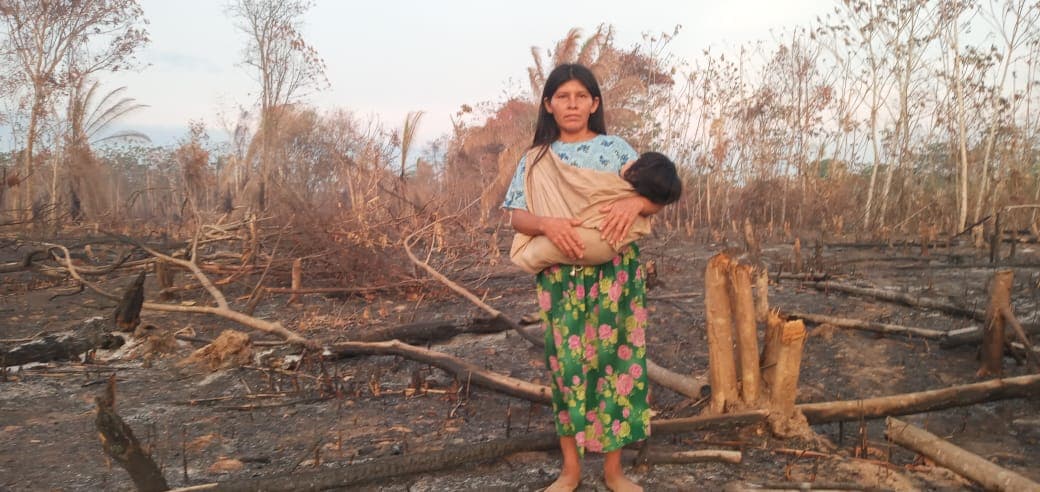SÃO PAULO, Brazil – A commission of the Latin American bishops’ conference is warning that a record number of wildfires in the Amazonian region of Bolivia are related to legal changes in recent years which have promoted deforestation and the conversion of vast swaths of territory to farmland.
In October alone, it’s estimated that more than 100,000 fire spots were detected in Bolivia, especially in the country’s Amazonian department of Beni.

On Dec. 14, the Commission of Indigenous Peoples of the Latin American and Caribbean Episcopal Council (CELAM) released a statement claiming that a 2019 law that opened more than 40 percent of Beni’s territory to agricultural exploitation negatively impacted “the territory and the ways of life of its inhabitants” and intensified the “effects of devastation and drought.”
The Bolivian bishops have urged urgent measures to ensure the protection of numerous Indigenous peoples that live in the most affected regions. The declaration of CELAM emphasized that the wildfires have been putting pressure on Indigenous communities to leave their territories.
According to the Commission, the legal changes in 2019 were made without the previous consultation of the region’s Indigenous residents, something it claims violates the International Labor Organization’s convention.
The impact of the wildfires on a number of Indigenous communities in Beni reportedly has been devastating. The Tsimane people, the commission said, have seen their traditional woods being reduced to ashes, as well as their maize and cocoa crops. Many people lost their homes and are now living in makeshift tents.
“We urge local and national authorities to take the appropriate measures to reverse the normative frameworks that encourage the violation of the Indigenous peoples’ right to their territory,” the statement read.
According to the Carmelite Sister Gladis Montecinos, who lives in Beni and works with the Tsimane, their lands are currently being “plundered.” Although they have been living in that area for thousands of years, she said the government doesn’t recognize their right to remain there.
“A number of ‘incendiary laws’ have been impacting the Indigenous peoples’ lives. They’re part of the government’s policy to expand the country’s farmlands, including in Beni,” Montecinos told Crux.
The missionary cited a 2015 act concerning food sovereignty, for instance. Its stated goal was to favor food production in small properties, but it ended up making it easier for ranchers to deforest protected areas, with direct consequences for Indigenous communities.
Montecinos said that Indigenous groups such as the Tsimane also resort to fires in order to prepare the land for planting, “but they know when they should and when they shouldn’t provoke fires.”
“This year, with the harsh drought and high temperatures, they decided not to burn any area. But the fires reached them anyway, coming from other sides, and their woods were totally destroyed,” she said.
Montecinos argued that the Bolivian government grounds its measures in an ideology of exploiting natural resources without limits. It’s part of such a policy to displace Indigenous populations.
“The constitution protects the entire Bolivian people and secures the Indigenous peoples’ rights. But in practice there are laws that put their lives in danger,” she said, adding that the “incendiary laws must be revoked” in order to ensure the protection of those peoples and of the environment.

Church missionaries such as Montecinos have been visiting villagers and listening to their problems since the crisis began. Parishes and church movements have also been providing help to the most affected communities.
Over the past few weeks, the rainy season has begun in the Amazon and the wildfires have been mostly extinguished. The consequences of the fire, however, continue to be felt in the most vulnerable villages, given that food production was greatly harmed.
In the neighboring Amazonian department of Pando, the fires deforested broad areas of national parks. In the city of Cobija, water was rationed due to the low level of the local rivers. The smoke spread over the cities and provoked respiratory problems, Father Juan Elias Ciripi told Crux.
“Many people had conjunctivitis due to the terrible quality of the air. Our local Caritas distributed medicines and food kits to the people,” Ciripi said.
Now, some heavy rains have already caused floods in some locations, the priest said.
“When one problem is over, a new one begins,” he said.















